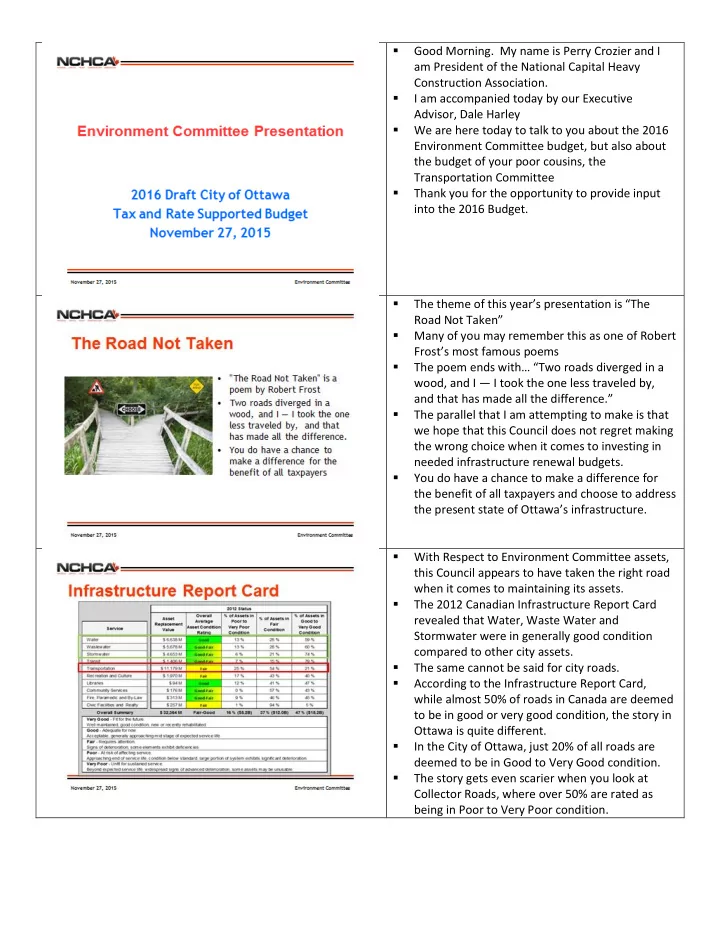

Good Morning. My name is Perry Crozier and I am President of the National Capital Heavy Construction Association. I am accompanied today by our Executive Advisor, Dale Harley We are here today to talk to you about the 2016 Environment Committee budget, but also about the budget of your poor cousins, the Transportation Committee Thank you for the opportunity to provide input into the 2016 Budget. The theme of this year’s presentation is “The Road Not Taken” Many of you may remember this as one of Robert Frost’s most famous poems The poem ends with… “Two roads diverged in a wood, and I — I took the one less traveled by, and that has made all the difference.” The parallel that I am attempting to make is that we hope that this Council does not regret making the wrong choice when it comes to investing in needed infrastructure renewal budgets. You do have a chance to make a difference for the benefit of all taxpayers and choose to address the present state of Ottawa’s infrastructure. With Respect to Environment Committee assets, this Council appears to have taken the right road when it comes to maintaining its assets. The 2012 Canadian Infrastructure Report Card revealed that Water, Waste Water and Stormwater were in generally good condition compared to other city assets. The same cannot be said for city roads. According to the Infrastructure Report Card, while almost 50% of roads in Canada are deemed to be in good or very good condition, the story in Ottawa is quite different. In the City of Ottawa, just 20% of all roads are deemed to be in Good to Very Good condition. The story gets even scarier when you look at Collector Roads, where over 50% are rated as being in Poor to Very Poor condition.
The 2014 Ontario Municipal Benchmarking Initiative report would seem to confirm the results of the Infrastructure Report Card. Ottawa wastewater and water pipes are on average about 30 years old. This is on par with the other cities participating in the study. The average number of wastewater main backups and watermain breaks in Ottawa are also on par. The same cannot be said about Ottawa Roads The 2014 OMBI report revealed that Ottawa had the worst roads of the major cities participating in the benchmarking study. Only 19% of paved roads in Ottawa were rated as being in good or very good condition. This compares to a mean of 54%. Clearly, road infrastructure in Ottawa needs attention. It is safe to say that the city has chosen the correct road when it comes properly maintaining its Environmental Services Infrastructure. This has been made possible by the city as a result of: adopting realistic increases for rate supported infrastructure; and Investing the vast majority of its infrastructure dollars on the renewal of these valuable assets.
While the City has reduced its capital investment this year, and the percentage of renewal investment has also declined, the planned future investments appear to be improving. The Long Range Financial Plan 4 was adopted in the last term of Council. This plan identifies a need to increase the tax supported funding for renewal of City assets to a level of $165 million per year to maintain a state of good repair versus the average historical expenditure on the renewal of roads, bridges, buildings and parks of only approximately $80 million per year. Unfortunately, tax supported funding for city assets is a long way behind rate supported assets. The good news is, is that as a Council, you appear to be getting it when it comes to infrastructure investment. Matthew Pearson of the Ottawa Citizen reported on November 11, 2015, the results of a survey about the upcoming budget. 96% of you noted infrastructure or roads in your responses 78% of you noted infrastructure renewal as a priority 70% specifically commented on the condition of roads. Here is what a few of you had to say:
In Conclusion: Maintaining a 2% tax increase is arguably the right road to take in terms of providing reliable and affordable City services. It would appear that Council has taken the right road when it comes to maintaining Environmental assets, but appears to have reached a fork in the road when it comes to Transportation assets. Evidence is mounting that the City must take “the road less traveled” in order to make a difference. This new road could include reallocating funding from across all budget envelops to help pay for needed infrastructure renewal. The City could also choose to increase debt to pay for these repairs before they cost even more in the future. This would be consistent with what the City is already doing. Investing more this year would also send a strong message to your provincial and federal partners that the City is prepared to step up to the plate on infrastructure project funding. Thank you for the opportunity to address the committee. I would be pleased to answer any questions you might have. For more information please contact Dale Harley, 613-882-5684
Recommend
More recommend